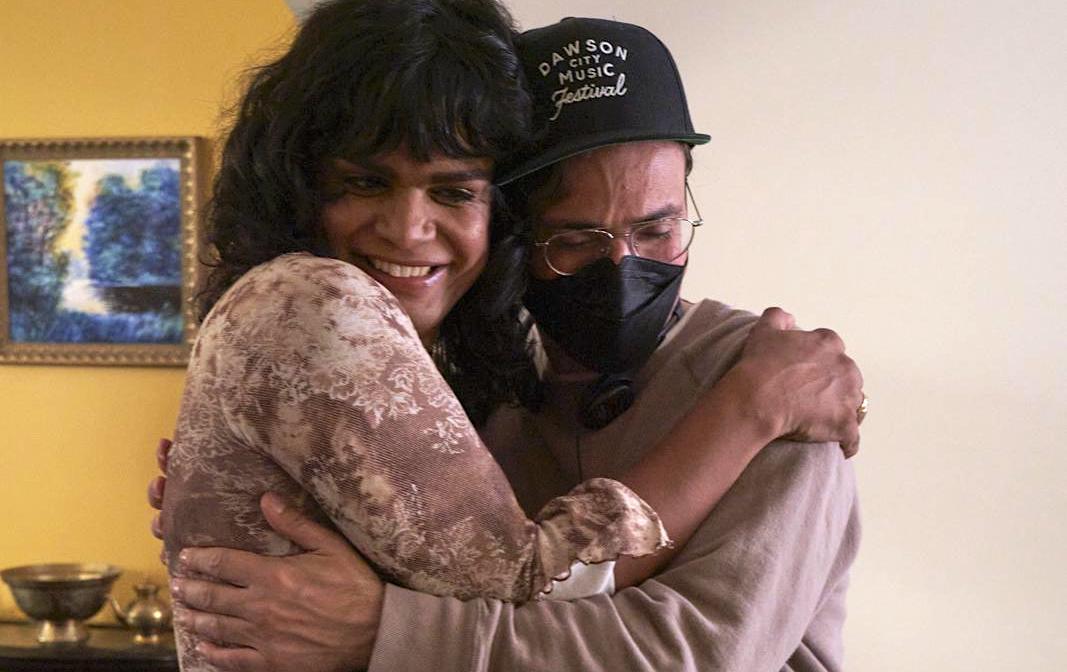Season 3 of Sort Of, CBC’s heartwarming series about the gender-fluid, brown, Muslim character Sabi, will be its last. CBC did not cancel the show; it was a decision jointly taken by its co-writers and co-producers Bilal Baig and Fabrizio Filippo. As Baig explains, it felt like the organic place to end the show (Season 3 begins Nov. 17 on CBC Gem and Max). Xtra connected with Baig by phone prior to their announcement on Instagram today about the series ending to talk about Sort Of’s long-term legacy, as well as the nuances of representing messy queer, non-binary and trans characters of colour on screen.
Even though Baig doesn’t have any big projects lined up, we can expect to see their co-edited anthology (with Evan Tsitsias), This Is Beyond: A Time Capsule of Queer Experience, from Playwrights Canada Press later this year. They are also returning to the theatre with two in-progress plays, as well as prioritizing rest.
Let’s start with the impact of Sort Of. In all of the reviews of the show since its inception, the consensus is that the show represents diverse, non-binary and queer characters whom we normally don’t see on mainstream TV shows. Given that we are in a local and global climate of rising transphobia, what do you think the lasting legacy of this show will be, especially for queer, non-binary and trans youth?
A lot of what I hear when I’m stopped on the streets, or when I receive a DM, is how comforting the show feels. People speak about a kind of human quality to it—it feels like we’re just watching human beings existing, and we embrace the kind of realness of what life might be like. And it’s not all nicely packaged, and bright and perfect or sweet. I feel in the third season, we go even deeper into harder emotional places for a lot of characters. My hope is that comfort will live on, that’s not going anywhere. It’s embedded in the making of the show across all three seasons. And there’s a gentleness to it too, like we’ve never been heavy-handed. That quality seems to really appeal to folks as well.
As a queer creator, do you see trans, queer and non-binary creators creating representations of themselves onscreen as being more impactful in contrast to cishet creators doing the same? Do you see this trend growing, given that your show was picked up by CBC and then HBO?
Yeah, I think so. I’m hearing more and more about this trend. I just found out a South Asian trans writer worked in the writers’ room of Sex Education’s fourth season. I’m hearing more and more that we’re entering spaces that are not just in front of the camera, and I do think it’s a really important part of this movement. Our stories need to be informed by our experience. I mean, I’m hopeful. I do recognize that there’s so much not-great stuff going on in the world, and even in our industry in terms of queer and trans shows getting cancelled, but I think that there’s enough proof now that when we are a real big part of the creative decisions behind the show, it makes a difference for the product.
In Season 3, the trajectory of Sabi’s journey starting hormone replacement therapy (HRT) feels like there could be a few more seasons. And yet, you and Fab made the decision to end the show. How did you and Fab arrive at the decision? Was there a single moment of “this is the right time,” or was it an accretion of multiple reasons or moments?
I think it’s more of the latter. Fab and I went into the third season, writing it, knowing that it would be the end. We kind of structured this season in a way where it expands a greater amount of time than the past few seasons have, and there feels like there’s still breadth here.
It just was a feeling between the two of us, that we got to capture a really specific moment in Sabi’s life. And then of course, all the other characters as well. I think it’s beautiful and heartbreaking. And that’s also been a real truth about the show—that its ache is a part of how we make it.
Apart from Sabi’s HRT journey, can you tell me a little more about the themes of Season 3?
The HRT journey came out of the conversations we were having about rebirth or really stepping into yourself and making choices from that place, but with the freedom and autonomy that Sabi finds and deals with after their dad passes. There’s a complicated notion—that we can feel sad and liberated at the same time. And then, we kind of carried that further. One of the big themes that is connected to Sabi’s arc in particular is this kind of feeling of centring yourself more and not always putting other people first.
But really, a lot of the characters this season are making really big choices that feel connected to their identity. The show has always been about identity, but this season feels like it is the most transformative, the most about transition in an overt way, and the most connected to characters and how they define themselves through their identities and the choices they make.
Yes, Sabi seems to become more assertive in Season 3, especially in their scene with the doctor. The doctor is supposed to represent science and being progressive, while the imam represents religion, which can be conservative. Yet you flip the script. It’s the doctor who turns out to be conservative, while the imam is super progressive. It’s an interesting choice of contrasts onscreen that may relate to your relationship with Islam. Can you speak to this choice of contrasts?
Oh, wow, thanks for that question [laughs]. At the end of Season 3, Episode 2, the doctor does prescribe HRT, when there was resistance at the beginning. But in general, our rule is that we’re not trying to cast intense judgment on any characters, especially our male characters, especially, South Asian men—the imam, the father and the doctor. That’s why the father in Season 2 has the arc that he does. It’s always interesting to me to find the layers of these characters.
I thought it was important to talk about trans people’s relationship to the medical world. And that is a challenge—like, a lot of the trans girls that I know feel uncomfortable with their doctor, don’t feel listened to by their doctor, and while that’s not necessarily everybody’s experience, it felt real to at least bring the conversation there. Aspiration and hope is the thing that lives in our show, too. It felt important that with this decision to have the doctor prescribe HRT, and Sabi gets what they want. Otherwise, it would be so bleak.
The doctor’s views of not initially wanting to prescribe speak to this huge thing in our communities about “what will people say?” and “think about your family” that felt so real.
In Season 2, there was a tacit—but correct— acknowledgment of toxic masculinity, especially in the case of Paul and Olympia’s husband. They are presented as juvenile at times. At the same time, if a woman or a transfemme character shows any assertiveness, then she’s seen as impulsive and irresponsible. Can you speak to that?
I think the strength of this show is having the characters across the kind of gender spectrum together deal with each other and how that manifests in these relationships. I’m in love with the way Paul evolves. Then when you look at the show as a whole across the three seasons, I feel like it’s a really lovely, slow journey in terms of the evolution of somebody who’s maybe not seeing the people around them, but who does kind of start to see that toward the end.
I feel like all I want to do is get men to listen, ease them into a kind of listening and opening up. So I’m trying to walk that line of presenting a real kind of complication in the relationship, especially something that’s created by a male character, and also not shitting on them, because then dudes stop listening.
Yes, you mentioned this in our last interview. But what I really appreciate about your show is that all the characters are imperfect, even your trans, non-binary characters. For example, when Olympia behaves badly with Sabi in Season 2, there is a real fuckboy energy about her.
And Sabi, too, is quite flawed. In the third season, Sabi feels so different from where we really started this journey and I can’t wait for people to kind of entertain that and talk about that, too.
The show represents the trans or gender-fluid South Asian body of Sabi as liminal, as if Sabi can only exist in a series of negotiated presents and not in future time. Can you speak to this liminal space, and what it means to you as a South Asian queer person who insisted on gender-neutral awards at the Canadian Screen Awards this year?
Going back to the legacy question that you asked, I think we created a space for a body like mine to kind of exist across three seasons, constantly stating the brownness alongside the transness, like one never exists alone, or one isn’t more painful than the other or one isn’t more joyous than the other. This kind of nuance, this kind of complexity is so deeply embedded in the show. And I feel really proud about being able to offer that image over and over again, especially to people in our community who want to see this kind of truth and deserve that. Even in the performance of it, it feels like it always exists. Sabi always exists in all of their identities all at once. In that second episode of Season 3, I love how much time we get to spend in that location of all of Sabi’s identities. Even though we’re not saying it, it’s an undercurrent in negotiating their gender the whole time.
What’s post-Sort Of look like for Bilal Baig?
Maybe you’ll be happy to know, I’m really thinking of theatre a lot. There’s these two plays that I kind of shelved for a couple of years, to work on, so I’m the most excited about theatre right now. But ultimately, I just asked for a little bit of rest. The output has been a lot for a number of years for me, and I’m really just interested in digesting, or being in service to somebody else’s project.
With the 2023 Writers Guild of America strike, I have a manager who’s based in L.A. and we’re really just cooking some early, early stuff in terms of what might be next for me or things that I’m interested in. But I can tell you, 100 percent, that there’s no huge project lined up for me. I’m looking forward to taking some time to think a little bit slowly and go a little internal and work on smaller things for a little bit. I’m resting a lot right now and am pretty grateful for it.


 Why you can trust Xtra
Why you can trust Xtra


